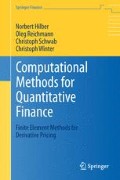Abstract
The finite element methods are an alternative to the finite difference discretization of partial differential equations. The advantage of finite elements is that they give convergent deterministic approximations of option prices under realistic, low smoothness assumptions on the payoff function as, e.g. for binary contracts. The basis for finite element discretization of the pricing PDE is a variational formulation of the equation. Therefore, we introduce the Sobolev spaces needed in the variational formulation and give an abstract setting for the parabolic PDEs.
Access this chapter
Tax calculation will be finalised at checkout
Purchases are for personal use only
Notes
- 1.
CFL is an acronym for Courant, Friedrich and Lewy who identified an analogous condition as being necessary for the stability of explicit timestepping schemes for first order, hyperbolic equations.
References
D. Braess. Finite elements, 3rd edition. Cambridge University Press, Cambridge, 2007.
A. Ern and J.L. Guermond. Theory and practice of finite elements, volume 159 of Applied Mathematical Sciences. Springer, New York, 2004.
L.C. Evans. Partial differential equations, volume 19 of Graduate Studies in Mathematics. American Mathematical Society, Providence, 1998.
J.-L. Lions and E. Magenes. Problèmes aux limites non homogènes et applications, volume 1 of Travaux et Recherches Mathématiques. Dunod, Paris, 1968.
D. Schötzau. hp-DGFEM for parabolic evolution problems. PhD thesis, ETH Zürich, 1999.
D. Schötzau and Ch. Schwab. hp-discontinuous Galerkin time-stepping for parabolic problems. C. R. Acad. Sci. Paris Sér. I Math., 333(12):1121–1126, 2001.
V. Thomée. Galerkin finite element methods for parabolic problems, volume 25 of Springer Series in Computational Mathematics, 2nd edition. Springer, Berlin, 2006.
Author information
Authors and Affiliations
Rights and permissions
Copyright information
© 2013 Springer-Verlag Berlin Heidelberg
About this chapter
Cite this chapter
Hilber, N., Reichmann, O., Schwab, C., Winter, C. (2013). Finite Element Methods for Parabolic Problems. In: Computational Methods for Quantitative Finance. Springer Finance. Springer, Berlin, Heidelberg. https://doi.org/10.1007/978-3-642-35401-4_3
Download citation
DOI: https://doi.org/10.1007/978-3-642-35401-4_3
Publisher Name: Springer, Berlin, Heidelberg
Print ISBN: 978-3-642-35400-7
Online ISBN: 978-3-642-35401-4
eBook Packages: Mathematics and StatisticsMathematics and Statistics (R0)

